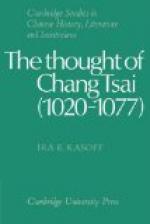|
This section contains 1,157 words (approx. 4 pages at 300 words per page) |

|
ZHANG ZAI (1021–1077), also known as Zhang Heng-qu, the second major Neo-Confucian thinker in the traditional lineage of Neo-Confucian teachers. Zhang Zai was a native of Chang'an in modern Shaanxi. His study of what became central Neo-Confucian texts began at the age of twenty-one when he corresponded with and then met Fan Zhongyan (989–1052), a prominent Confucian official. Fan suggested that Zhang Zai begin his study with the Zhongyong (Doctrine of the mean). This advice led Zhang Zai to study Confucianism, but like many Neo-Confucians he also studied Buddhism and Daoism, particularly their religious practices such as meditation. Eventually, however, he rejected their philosophies and returned to Confucian classics. Zhang Zai was appointed to office in 1057 and became widely recognized as one of the major interpreters of Confucian teachings. He eventually resigned from office over disagreement with the reform measures of Wang Anshi (1021–1086), a figure of major political...
|
This section contains 1,157 words (approx. 4 pages at 300 words per page) |

|


